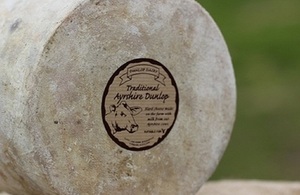Ayrshire Dunlop cheese wins protected status
Traditional Ayrshire Dunlop joins the pasty and the pork pie as it gains Protected Geographical Indication (PGI) status.

Traditional Ayrshire Dunlop cheese
Cheese lovers across the world now have another slice to add to their cheese board as Traditional Ayrshire Dunlop cheese becomes the latest food to be awarded protected status, Environment Secretary Elizabeth Truss has announced.
The 300-year-old cheese is set to be given the same Protected Geographical Indication (PGI) status as the Cornish pasty and the Melton Mowbray pork pie through the European Commission’s PGI scheme, benefitting cheese producers across Ayrshire.
63 unique UK foods have now achieved protected status to help safeguard our best-loved, great British produce from imitation. Businesses awarded with this status have reported a boost in sales, helping power local economies, increase employment and drive up tourism.
Environment Secretary Elizabeth Truss said:
Trademarking our best-loved foods means more than simply protecting them from pale imitation—it’s also about using our proud food heritage to bring greater investment, jobs and tourism to local communities, part of our long-term economic plan for food and farming.
I’m delighted to see Traditional Ayrshire Dunlop take its rightful place alongside Blue Stilton and Yorkshire Wensleydale, recognising more than 300 years of tradition in the heart of Scotland and I want to see many more cheeses join this list.
Developed in the village of Dunlop in the 17th Century and revived in 1989, the ancient recipe uses milk from Dunlop cows reared in lush pastures that enjoy favourable rainfall and clay soils. These unique conditions have enabled Scotland’s latest protected food name to gain an international reputation which continues to the present day.
Being granted PGI status ensures that Traditional Ayrshire Dunlop is produced in a designated area in accordance to a time-honoured traditional recipe, giving consumers certainty about the authenticity of the cheese they are buying.
On receiving the PGI status Ann Dorward from Dunlop Dairy said:
I am delighted that Traditional Ayrshire Dunlop has been awarded PGI status. This will ensure the provenance and methods of production of this cheese will not be forgotten in years to come.
Ayrshire Dunlop now joins the ranks of some of Scotland’s iconic foods such as Orkney Beef, Stornoway Black Pudding and Scottish Farmed Salmon. It is estimated that protected food names have helped contribute more than £900 million to the European economy.
The UK’s increasing number of protected food names has further helped to grow our food and drink industry, which remains the country’s biggest manufacturing sector with the food chain contributing £103 billion a year to our economy and employing 1 in 8 people. The industry now brings 16,000 new products a year to the market, more than France and Germany put together and second in the world only to the US.
Notes to editors
- Ayrshire Dunlop cheese will officially receive its protected status within the next six weeks.
- A full list of the UK’s protected food names is available online.
- An interactive map of all of the UK’s protected food names is available online.
- In 1993 EU legislation came into force which provides for a system for the protection of food names on a geographical or traditional recipe basis.
- The EU protected food name (PFN) scheme highlights regional and traditional foods whose authenticity and origin can be guaranteed. The product is awarded one of three marks: Protected Designation of Origin (PDO); Protected Geographical Indication (PGI); and Traditional Speciality Guaranteed (TSG).
- Producers who register their products for protection benefit from having a raised awareness of their product throughout Europe. This may in turn help them take advantage of consumers’ increasing awareness of the importance of regional and speciality foods.
- For more information please contact Defra’s press office on 020 7238 1822 or out of hours on 0345 051 8486.